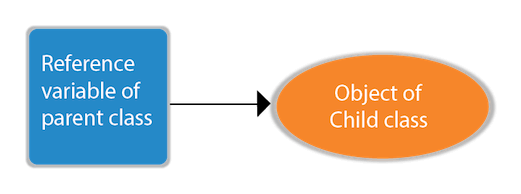Polymorphism in Java is a concept by which we can perform a single action in different ways. Polymorphism is derived from 2 Greek words: poly and morphs. The word "poly" means many and "morphs" means forms. So polymorphism means many forms.
There are two types of polymorphism in Java: compile-time polymorphism and runtime polymorphism. We can perform polymorphism in java by method overloading and method overriding.
If you overload a static method in Java, it is the example of compile time polymorphism. Here, we will focus on runtime polymorphism in java.
Polymorphism in Java
Polymorphism in Java is a concept by which we can perform a single action in different ways. Polymorphism is derived from 2 Greek words: poly and morphs. The word "poly" means many and "morphs" means forms. So polymorphism means many forms.
There are two types of polymorphism in Java: compile-time polymorphism and runtime polymorphism. We can perform polymorphism in java by method overloading and method overriding.
If you overload a static method in Java, it is the example of compile time polymorphism. Here, we will focus on runtime polymorphism in java.
Runtime Polymorphism in Java
Runtime polymorphism or Dynamic Method Dispatch is a process in which a call to an overridden method is resolved at runtime rather than compile-time.
In this process, an overridden method is called through the reference variable of a superclass. The determination of the method to be called is based on the object being referred to by the reference variable.
Let's first understand the upcasting before Runtime Polymorphism.
Upcasting
If the reference variable of Parent class refers to the object of Child class, it is known as upcasting. For example:

Program
{ float getRateOfInterest() { return 0; } } class SBI extends Bank { float getRateOfInterest() { return 8.4f; } } class ICICI extends Bank { float getRateOfInterest() { return 7.3f; } } class AXIS extends Bank { float getRateOfInterest() { return 9.7f; } } class TestPolymorphism { public static void main(String args[]) { Bank b; b=new SBI(); System.out.println("SBI Rate of Interest: "+b.getRateOfInterest()); b=new ICICI(); System.out.println("ICICI Rate of Interest: "+b.getRateOfInterest()); b=new AXIS(); System.out.println("AXIS Rate of Interest: "+b.getRateOfInterest()); } } Output:- >javac TestPolymorphism.java >Exit code: 0 >java -cp . TestPolymorphism SBI Rate of Interest: 8.4 ICICI Rate of Interest: 7.3 AXIS Rate of Interest: 9.7 >Exit code: 0 Example No 2 class Animal { void eat() { System.out.println("Eating"); } } class Dog extends Animal { void eat() { System.out.println("Dog Are Eating"); } } class babydog extends Dog { void eat() { System.out.println("Baby Dog is Eting"); } public static void main(String args[]) { Animal b1,b2,b3; b1=new Animal(); b2=new Dog(); b3=new babydog(); b1.eat(); b2.eat(); b3.eat(); } } Output:- >javac babydog.java >Exit code: 0 >java -cp . babydog Eating Dog Are Eating Baby Dog is Eting >Exit code: 0 |

Comments